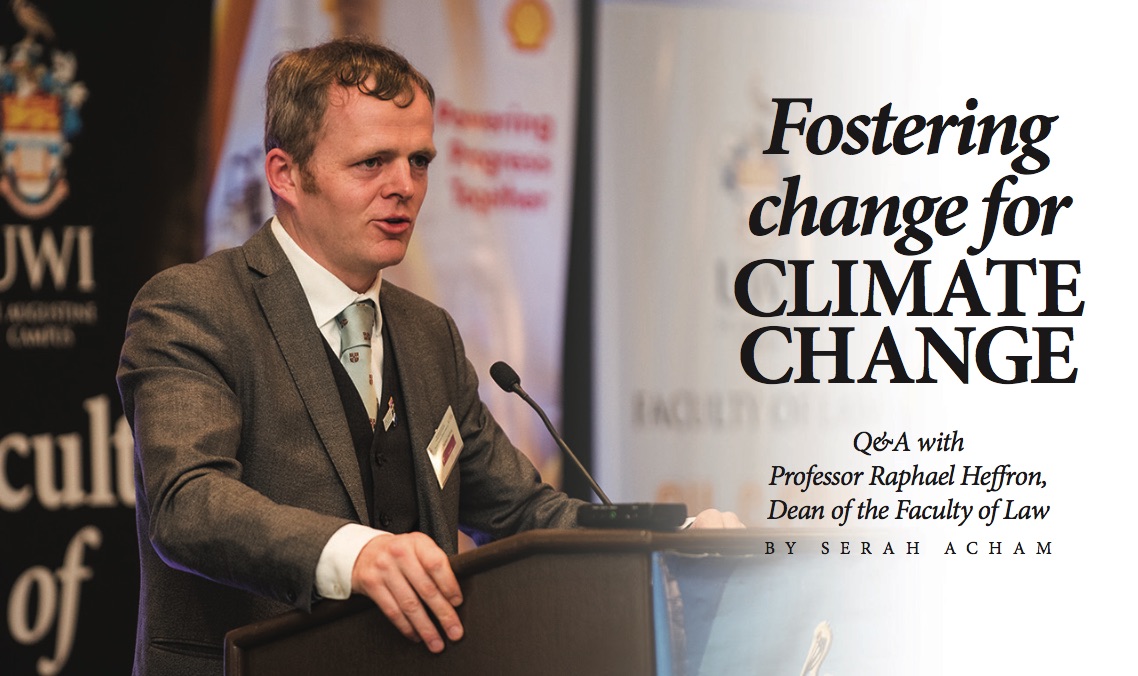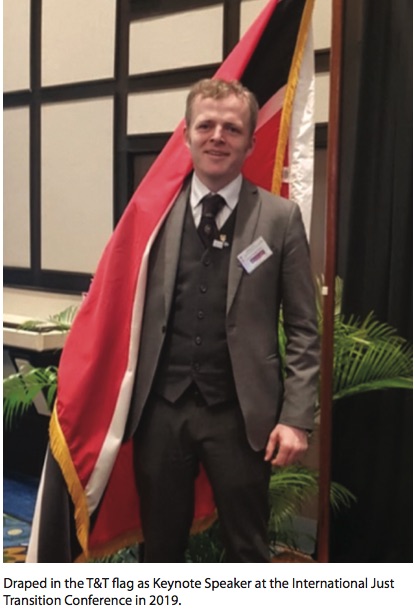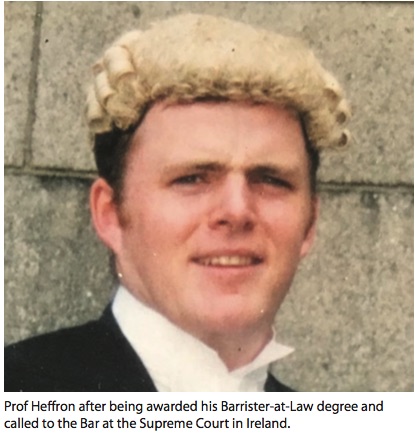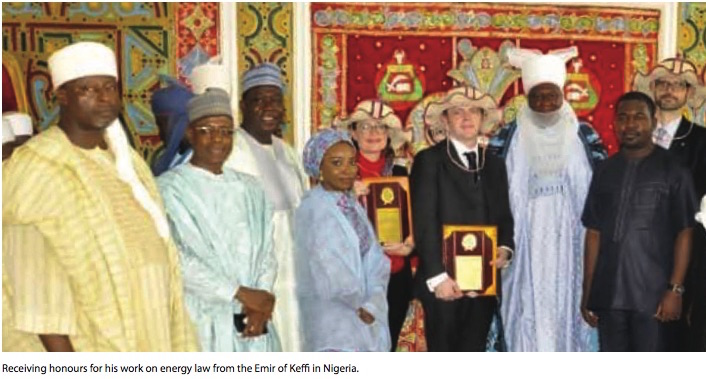
From the courtroom to the conference room to the classroom, Professor Raphael Heffron’s career is the epitome of multifaceted. Combining the areas of law, economics, energy and climate change, policy, and education, his work on achieving a just transition to a low-carbon economy has impacted and continues to impact countries around the world.
Hailing from Cobh – a very small island on the coast of Ireland, he specifies – he identifies himself simply as an academic who also holds a “Barrister-at-Law qualification”.
On November 1, 2021, he was welcomed to The UWI St Augustine Campus as the new Dean of the Faculty of Law.
Recently, UWI TODAY chatted with Professor Heffron to learn about the man, his work and his plans for the Faculty of Law.
UT: You’ve had quite a career – multifaceted, impactful and well-recognised. How did you get here?
RH: Every journey, I suppose, starts with hard work. There is a saying, “the harder you work, the luckier you get”, so I was blessed with some fortune along the way. After qualifying as a barrister-at-law, I went back to do a doctorate.
The corner stone of my work is advice, trying to bring more justice into the whole area of energy, environment, and climate change. If we can ensure more justice in this area, we will ensure that we deliver a better world for the next generation.
That has allowed me to be in the position to give talks, and work with great people, in different places across the world. I’ve been a visiting professor in universities in Africa, Asia/Pacific, Europe, and over here in the Americas. I was a visiting professor here in Trinidad in 2019 and enjoyed my time. Now I’m back.
I did some research in the Americas and, broadly speaking, inside the Caribbean and across the Americas. I thought that it would be a great opportunity to come to this region and to help continue the good work that has been done at the Faculty of Law by Professor [Rose-Marie Belle] Antoine [the previous dean].
Knowing that the university has already invested in energy and climate change issues, it was a great opportunity to be located in the region and to connect with some of the research and practitioner collaborators that I have, as well as to develop my research in this region.

UT: Do you currently practice law?
RH: I am a Senior Counsel in Janssen Law Firm in Brussels. In this position, I’m not practicing. I’m able to practice, but there are only so many hours in the day. However, I am engaged in the practitioner community. I regularly write for practitioner magazines. I give many presentations to practitioner communities, at least 10 times per year. I think, when you’re teaching law, you have to have both the academic as well as the professional side. Many students are going out into the legal practice to become lawyers and it’s our responsibility to prepare them for the challenges ahead. Climate change, and how we manage our economies as a result of it are going to be the biggest challenge of our lifetimes.
UT: Tell us more about the challenge that climate change poses, particularly in the context of law.
RH: Climate change, sustainability, the reason they’re so important is that they have created a new form of risk in society and they require us to think about risk in different ways. That is not just policy makers or here at the university. People are becoming more aware that we have a responsibility to think about climate change and about being a bit more sustainable.
The research of people I’ve worked with has enabled me to speak at different venues, and we see more and more events that are championing climate change and sustainability issues. For my legal community, we need to take the approach that climate change and sustainability risk must be added into the legislation. We’ve come to a point today where you cannot ignore these risks anymore. If today, as a lawyer, you say “I didn’t know those risks existed”, in a few years, your client will respond, “how could you not know?”
Lawyers will be held accountable in the future, and that’s one of the big drivers when you think of climate change and related sustainability issues – we need to make sure that every lawyer coming out of the education system today is fully equipped with the knowledge necessary to represent their clients on the issues of climate change and sustainability.

UT: Can you share a bit about your research?
RH: My research is to address the issue of justice in our economies. The energy sector is one of the biggest in the global economy [and] in many national economies, so my research is to look at how we can ensure that the energy sector gives value to all people in society. In order to do that, you have to contribute to goals such as the climate goal and the environmental goals. You also have to address things like distributing the wealth that we gain from energy resources, and recognising that some people’s lives can be affected in different ways by energy or climate change issues. You have to ask how we will attend to and compensate those people. We are also required to think about the bigger commitment to international climate change issues.
My research focuses on looking at the legal solution, so ensuring that you have legal frameworks that companies, the public or governments can follow to achieve more just outcomes for society. So when we think of how our economies and societies are going to develop over the next five [to] thirty years, we need ... fair outcomes and … we need a just transition. The idea of a just transition is not to leave anyone behind, and this has been a problem in the past and has led to a lot of societal inequality all over the world. That is the key emphasis of my research – trying to ensure that in this new transition ... no one is left behind … I think if we do that, people will have more confidence in the way society will progress in the future and, overall, that should make society happier.
UT: Your impact in your field has been wide. What motivates you?
RH: It keeps being interesting because the change is happening every year and is speeding up. The technology is getting better. Governments are more active, and that means businesses have to get more active. If you’re doing work in this energy climate, environment, sustainability, and law space, it’s like your work is being updated every year. It keeps challenging you and maintains your excitement. Also, you can teach the students, not only the things they need to know for next year, but also things that will be relevant to them for the next five to 20 years.

UT: What are your plans for the Faculty of Law?
RH: My plans are to, first, continue the good work of Professor Antoine and the Faculty. [It has] grown a lot over the last two terms of her office [and] has to continue growing, building its reputation, nationally and internationally. The faculty is very strong at teaching, so we have to make sure we continue that, as well as grow in terms of research and recognition as a leading research community in law in the world.
As I mentioned before, we have to think about how to educate the lawyer for tomorrow’s world and that’s why climate change is so important. In any type of commercial, civil, or even criminal or family law, it is going to be unavoidable. You will have to ask yourself, “did I address climate change and/or sustainability issues?”
We also need to think about the skill set ... Lawyers need to become comfortable with [using] technology as they practice law ... data driven analysis is widespread throughout society, so there is increasingly going to be a need for tomorrow’s lawyer to understand some element of analytics.
For me, ensuring that the law student who passes through the St. Augustine Campus [comes] out with all the skills and the key knowledge that would separate them from other lawyers and [that] they should then go on to have a successful career, whether it be in law or related areas, [is important].
UT: Tell us a little bit about yourself outside of your professional life. What do you enjoy doing?
RH: I enjoy a range of activities. One of the plusses of Trinidad, I hear, is the great hiking potential around the island and, obviously, a lot of beaches. I also play some sports, such as football, and I can even play some golf, though the weather might be a bit too hot. I’d have to go out there early in the morning. I have an active off-campus life and I’m hoping to enjoy that more now that I live in a warm climate. It’s quite hard to get out when it’s only 1°!